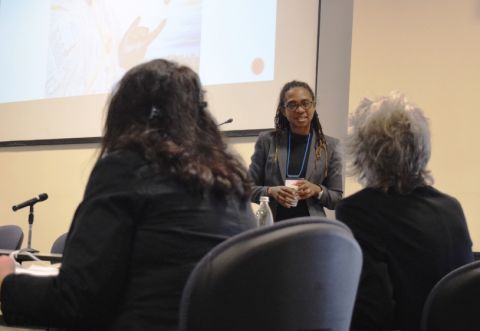
Feminist Legal Studies Queen’s hosted a two-day conference last weekend on “Gender, Intersectionalities and Sustainable Development: Food Security, Economic Equality and Women’s Empowerment.”
Professor Angela Harris of the University of California’s Davis School of Law gave the keynote address. Her discussion examined the connection between food sovereignty and gender.
Davis took attendees on a historical review of how deeply stratified United States agriculture has been along lines of race and class. As she deconstructed the historical images and meanings of the “family farm” and “agrarian ideals,” she presented the legal history that made exclusion in land ownership possible. For example, she explained racialized dispossession of agricultural land contextualized by the expansion of “property rights” in the U.S. judicial system.
Intersecting race, gender, and food sovereignty, Davis explained how women in new black agrarianism have come to embody a movement from equality to freedom. “From environmental justice to reproductive justice movements, women are at the forefront,” she said. “Women’s gendered role as caretaker makes visible the need to have access to ‘life rights’ – the goods of land, water, sea that sustain life on earth daily.”
What is the relevance of the junction of food sovereignty, race and gender for lawyers? Davis sees that there is a lot of work to be done for the legal community to create space for food sovereignty in the form of municipal and regional councils and policy creation. She gave an example from the Bay area in San Francisco, “where lawyers were part of the push to declare urban agriculture as a right in the city.”
Student attendee Joycna Kang, Law’20, explained how the intersecting themes of Davis’s keynote speech resonates with her as an executive member of the Queen’s Women in Law club. “Forums that bring together the issues of race, gender and sustainability open up a vast array of opportunities for lawyers – especially female lawyers – to be part of an important dialogue.” She is excited about the future of FLSQ and Queen’s Law initiatives that create space for this dialogue.
The overarching theme that Davis left the FLSQ attendees with was that subsistence, in this case in the form of agriculture, is, “a basic right, a call beyond legal rights,” she explains, “that’s something that connects people around the world.”
Conference panelists addressed several important questions: How do the histories racial discrimination, Indigenous displacement, and gender hierarchies in the U.S. and Canada inform current policy strategies? How can peoples historically uprooted from their origins and left on the margins of productive economies to provide undervalued or appropriated labour to landowners regain sustainable positions under conditions of growing corporate concentrations of wealth and power?
FLSQ, co-directed by Professors Bita Amani and Kathleen Lahey, is an autonomous research group at Queen’s fostering scholarship in feminist legal studies. Each year, FLSQ holds a conference to celebrate International Women’s Day.
By Quinn Brown